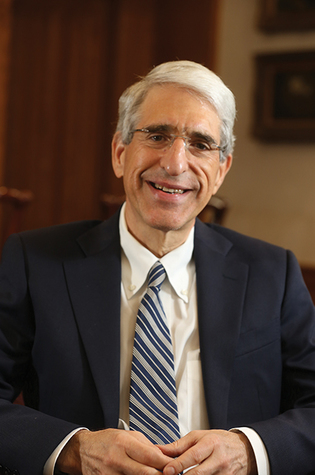
Mark Ostow
The Yale Alumni Magazine publishes a letter from President Peter Salovey ’86PhD in every issue. In this letter, the president discusses the continuing effort to make Yale more affordable and accessible.
View full image
Dear Friends,
In May, we held two commencement ceremonies—a long-awaited celebration for the Class of 2020 and one for the Class of 2022. As I watched the procession of our graduates on Old Campus, I was reminded of all the ways they have made history. In addition to earning their degrees during a time of global disruption, they represent the most socioeconomically diverse classes in Yale’s history.
I loved seeing so many familiar faces in the crowd of graduates—among them, a veteran who spent four years as part of the US Army’s 75th Ranger Regiment, a first-generation student who helped build community through Public Health Education for Peers during periods of prolonged social distancing, and so many others who have excelled at Yale and more broadly.
In recent years, we have made great strides in expanding financial aid across the university. Great leaders come from many backgrounds—from small towns and large cities, and from countries around the world. Wherever they are from, we need their promise and their ideas. We make investments in access to ensure that Yale’s student body includes a broad range of talents and viewpoints, which improves students’ educational experiences and better prepares them for leadership in a diverse society.
The American Talent Initiative, a national alliance of leading colleges and universities, has recognized Yale as one of its most successful members for rapidly increasing the enrollment of undergraduate students eligible for Pell Grants, a federal need-based program for low-income students. Pell-eligible students in the first-year class have nearly doubled, from 157 who matriculated in fall 2013 to 307 who matriculated in fall 2021. In addition, there are approximately 400 more first-generation students in Yale College today than in 2013. These are students who are the first in their families to attend college. Last fall, Yale enhanced its undergraduate financial aid packages for the fourth time in six years. Today, about 85 percent of Yale College students graduate debt-free.
Addressing the high levels of debt among students graduating from some of our professional schools is another special focus of mine. As of this academic year, the David Geffen School of Drama joined the School of Music in being tuition-free for all present and future students. In January, Yale Divinity School announced that a combination of fundraising success and endowment performance made it possible for it to meet the full tuition need of all students receiving financial aid, and to provide a small stipend for all students with demonstrated need, beginning next year. For the full-time MBA program, Yale School of Management doubled scholarships offered to incoming students. Last November, Yale Law School established a new leadership program to transform legal education by providing innovative courses and mentorship to students interested in both traditional legal practice and nontraditional careers. The Law School also launched the Hurst Horizon Scholarship Program, which provides full tuition to students from families below the poverty line. In addition, the Graduate School of Arts and Sciences is increasing stipends for all doctoral students, to address the rise in cost of living in New Haven and reduce differences in stipend levels across divisions.
In the years ahead, we will work to secure even more resources for financial aid. We want to help students set their career paths without financial constraints. Therefore, we recently announced a historic goal of raising $1.2 billion to help make a Yale education more affordable and accessible. The initiative, part of Yale’s $7 billion For Humanity campaign, focuses on new giving for scholarships and fellowships in Yale College, the graduate school, and the professional schools.
As I think about our recent graduates and those who will study here in the years to come, I have never been more confident about the profound positive impact our students will make in the world. At the heart of Yale’s mission is our commitment to educating leaders who will serve all sectors of society. Every investment we make in talented students, regardless of an individual’s background or ability to pay, allows us to transform the world through discovery and practice.
With my warmest wishes,
Peter Salovey ’86PhD
President
Chris Argyris Professor of Psychology
 loading
loading